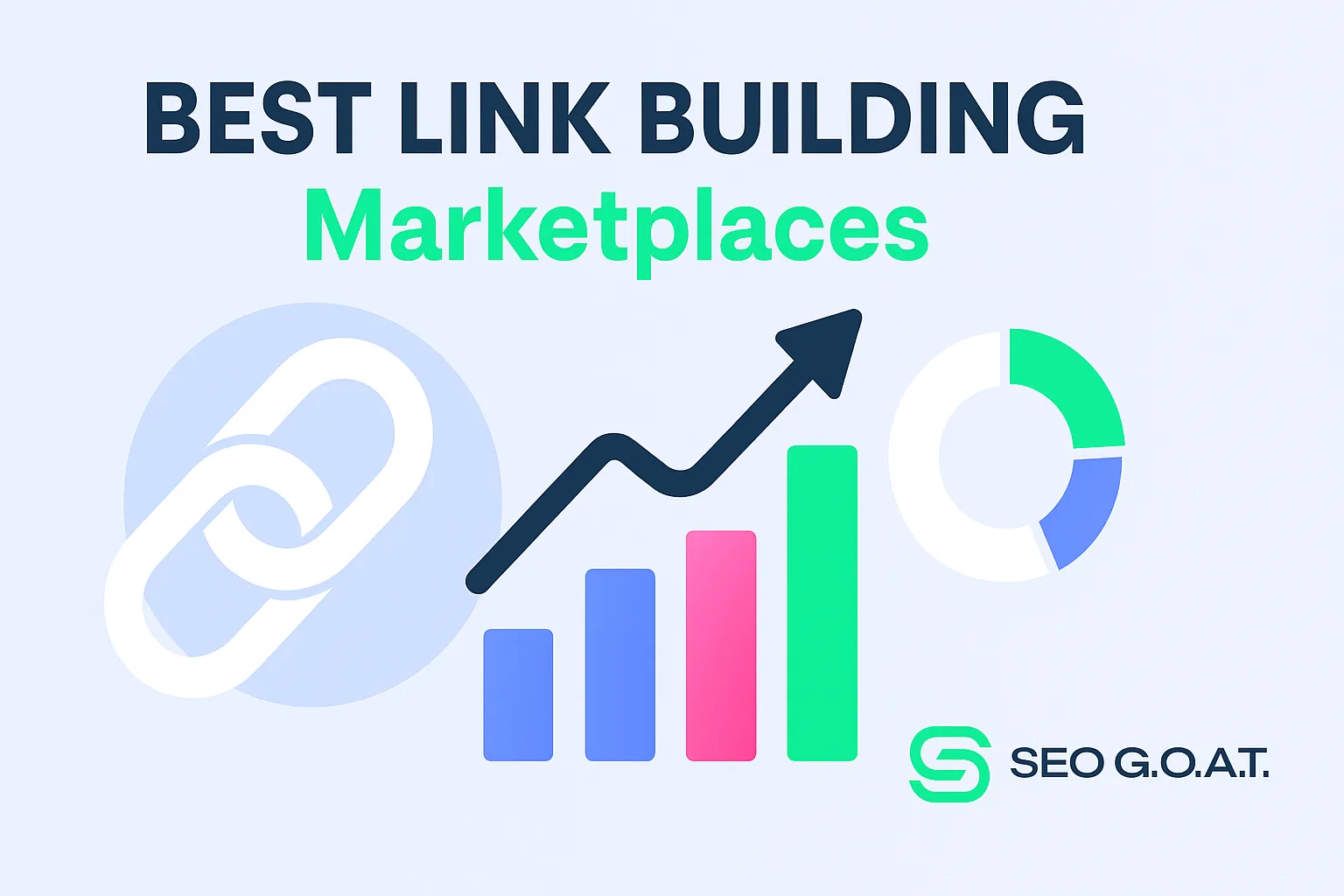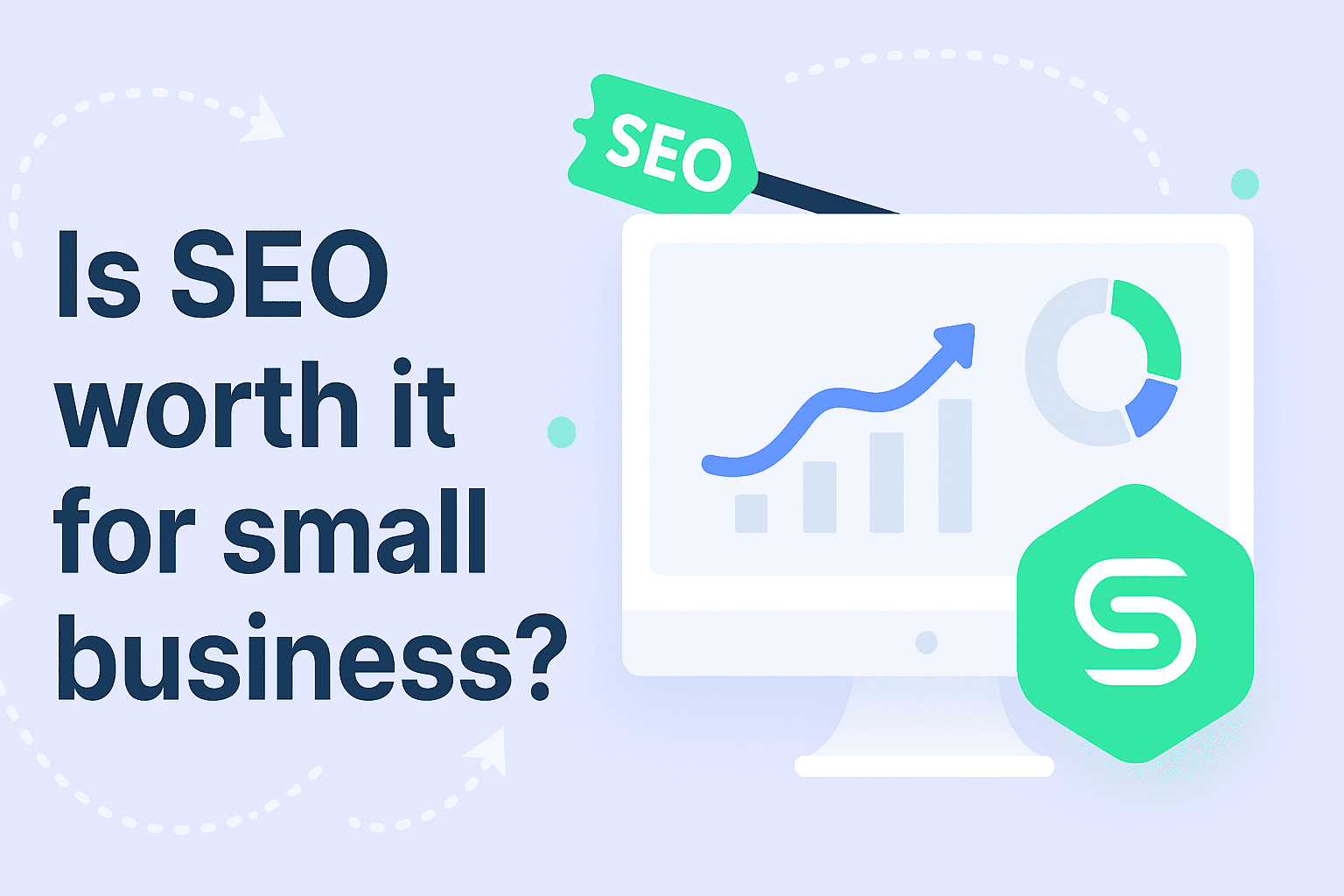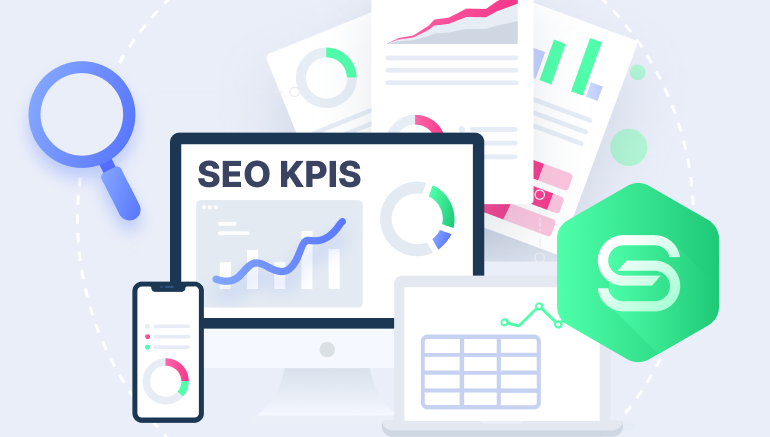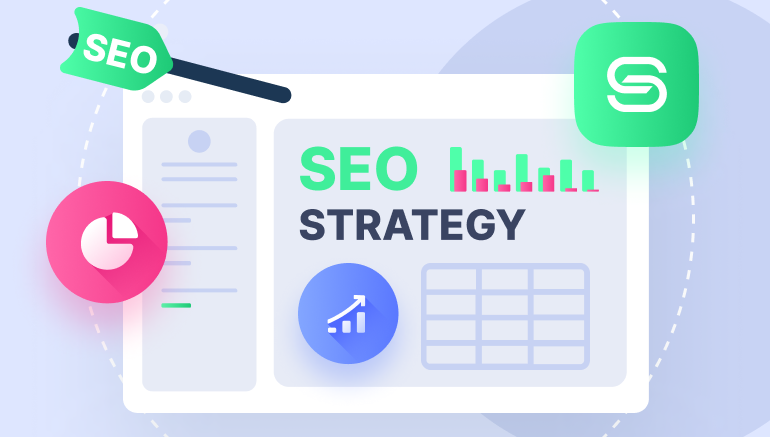SEO for Plumbers – Complete Local SEO Strategy
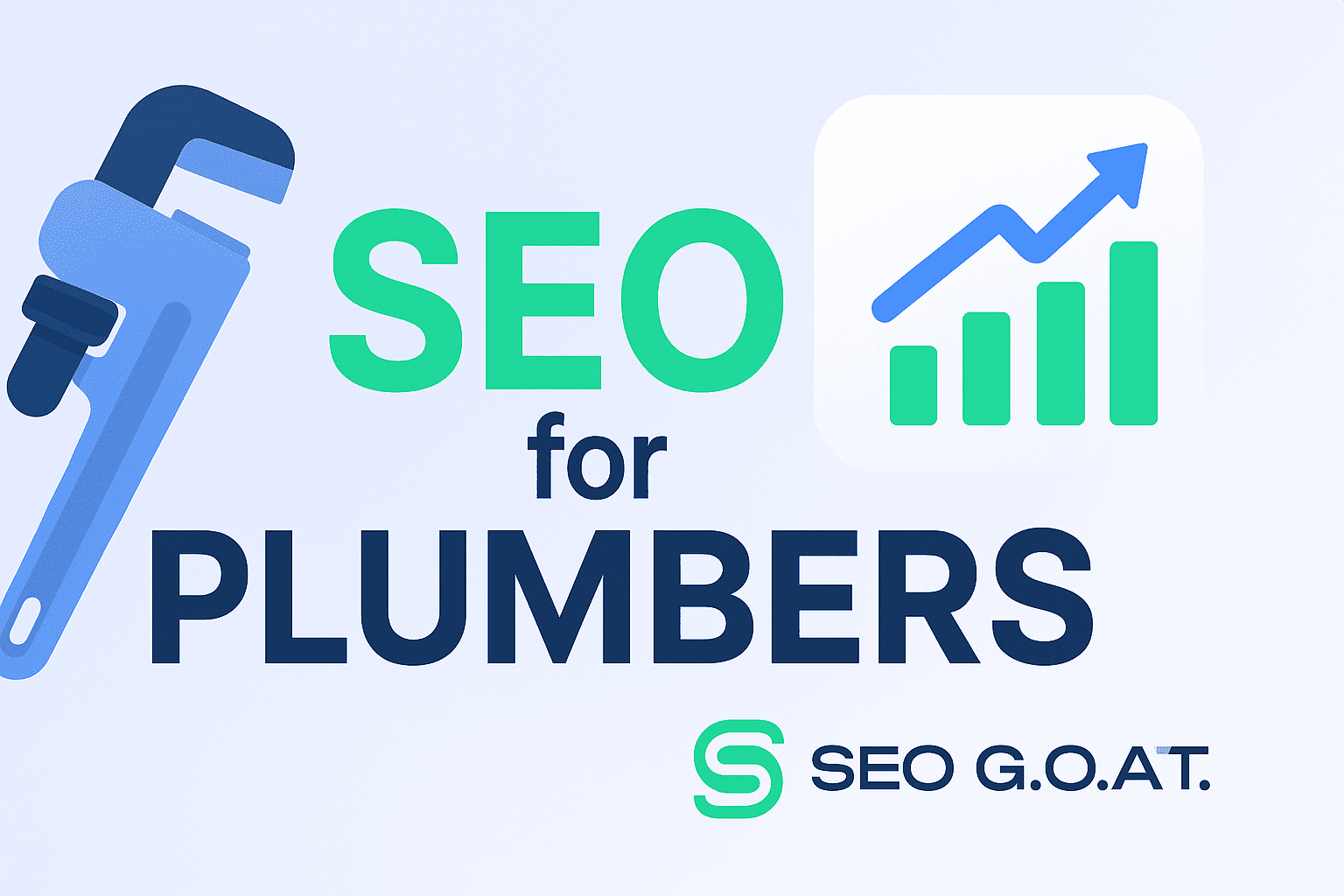
Key Takeaways
- Local SEO helps plumbers appear exactly when customers need emergency help.
- Google Maps rankings bring in 40%+ of leads for many plumbing companies.
- Keyword research ensures your service and location pages match real searches.
- Technical SEO keeps your site fast, mobile-optimized, and fully crawlable.
- Guest posting builds trust and backlinks – and we can help with that.
What Is Local SEO for Plumbers and Why It Matters
When someone has a plumbing emergency – a flooded kitchen, a broken water heater, or a clogged drain – they’re not browsing Instagram. They’re typing something like “emergency plumber near me” or “24/7 plumbing service in Chicago” into Google. And if your business isn’t showing up in those results, they’ll call someone else.
Local SEO makes sure you’re the one they find. That includes your Google Business Profile, pages for each city and service, and being listed on directories like Yelp, Angi, and HomeAdvisor. For example, a plumber in Phoenix should have a page for “drain cleaning Phoenix” to appear in map results.
Why Is Local SEO Important for Plumbers?
Plumbing issues are urgent. Customers aren’t comparing five websites – they call the first one that looks solid.
If you show up in the map pack for “emergency plumber in Phoenix,” you get the call. With average jobs ranging from $200–$700+, even a few extra leads a month make SEO profitable.
Quick stats:
- 46% of Google searches are local
- 78% of mobile local searches lead to a purchase within 24 hours (Source: HubSpot)
Local SEO doesn’t just bring traffic – it drives real booked services.
Google Maps SEO for Plumbers: What to Do
Google Maps gets most of the clicks on mobile. To show up there, your Google Business Profile has to be solid.
Here’s what works:
- Claim and verify your profile
- Include plumbing keywords in the business name if allowed (e.g., “QuickFix Emergency Plumber Austin”, “ProDrain Plumbing Repair NYC”, or “Rapid Rooter – Licensed Plumber Houston”). This helps your profile show up for local keyword searches like “plumber near me” or “drain cleaning [city]” – especially important for high-intent mobile queries. Be sure to align the name with what’s on your signage and legal documents to avoid suspension by Google.
- Write a strong business description with services and locations
- List all your services (water heater installs, drain cleaning, etc.)
- Add real photos of your team, van, and recent jobs
- Ask customers to include keywords in their reviews (e.g., “Denver drain unclogging”)
- Reply to reviews and post updates weekly
If your company operates in multiple cities, create a separate profile for each verified location. More profiles = more visibility in local packs.
Also, embed a map on your contact page and use LocalBusiness schema to help Google understand your service area.
Keyword Research for Plumbers: Where SEO Starts
Before writing anything, figure out what your customers actually search. Keyword research shows which terms have buyer intent and helps structure your site.
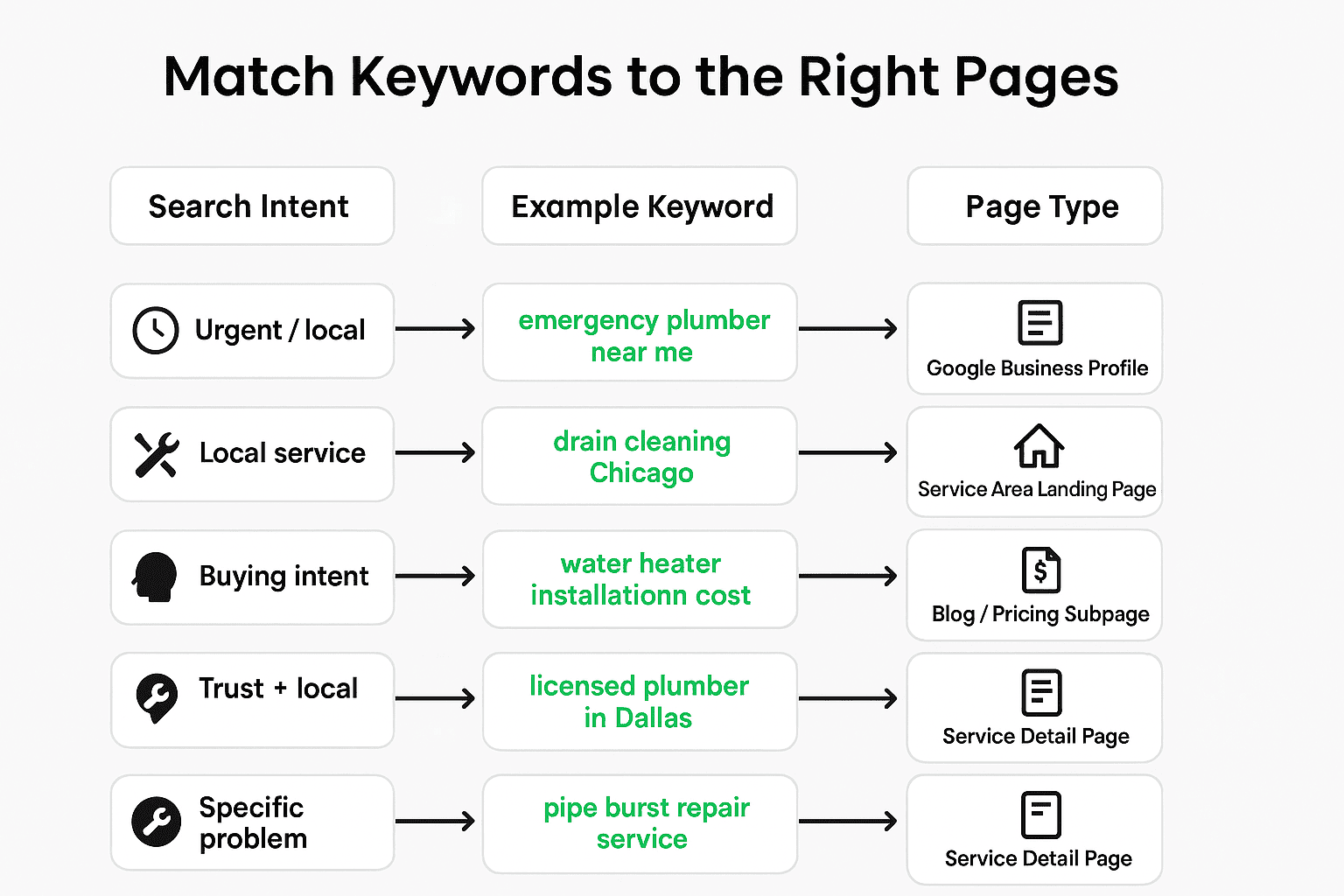
After that
- Group keywords by topic and location
- Create focused pages for each
- Write content briefs for every page that cover:
- Title tag
- H1, H2s, H3s
- Keyword mentions, internal links, ALT tags
Use People Also Ask and tools like AnswerThePublic to build smart FAQ sections. Wrap them in FAQPage schema markup for bonus visibility.
Technical SEO for Plumbers: Don’t Skip This
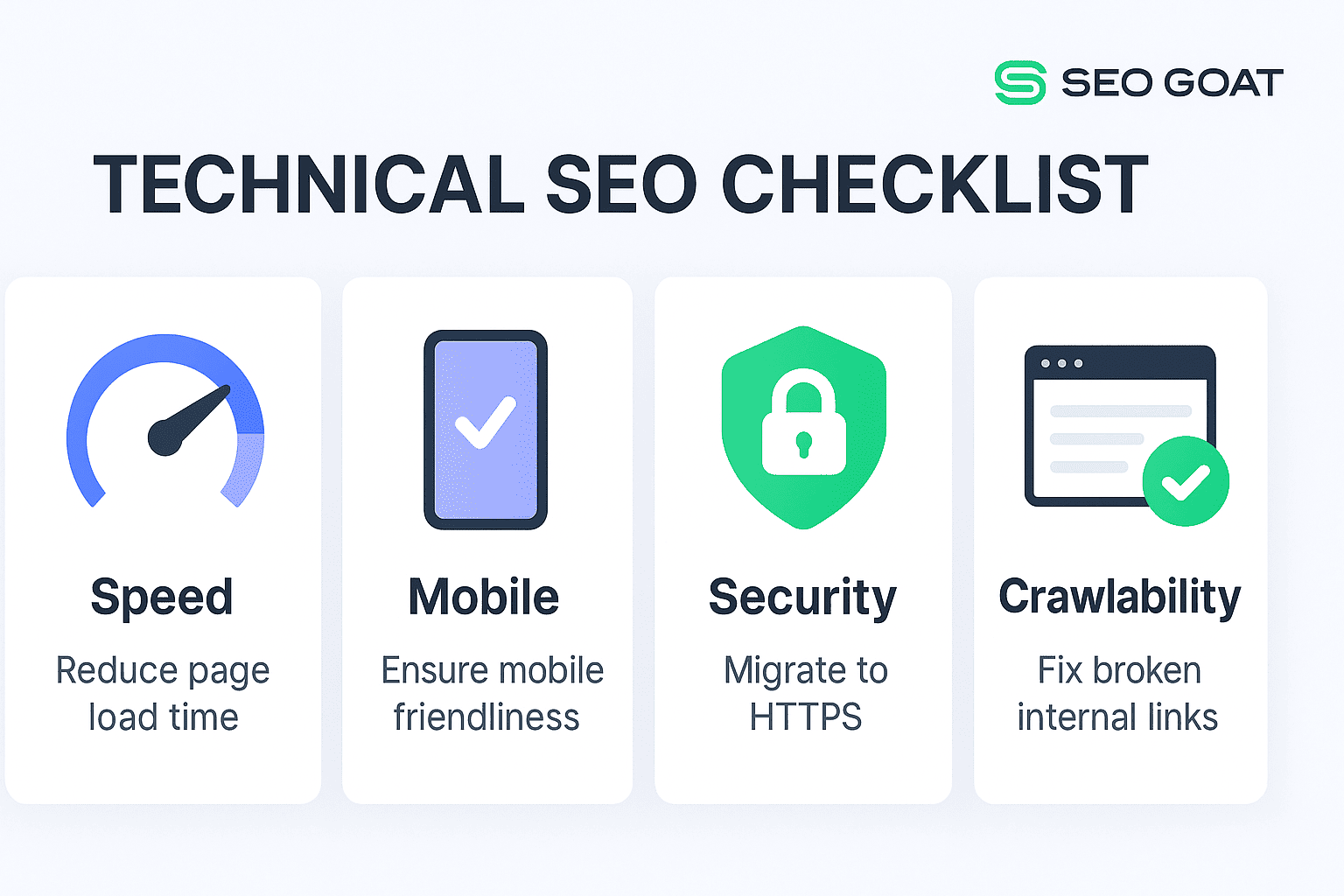
Even with great content, you won’t rank if your site is slow or clunky. Technical SEO fixes that.
Key areas
- Speed – use Google PageSpeed Insights to measure load time. Focus especially on mobile scores, image compression, and time to first byte. A slow website often means missed leads – users will bounce if your homepage doesn’t load in under 3 seconds.
- Mobile – most searches happen on phones. Make sure your site is responsive, touch-friendly, and loads cleanly on all screen sizes. Focus on mobile CLS (cumulative layout shift), tap target spacing, and avoiding intrusive popups – Google flags all of those.
- SSL – HTTPS keeps user data safe
- Crawlability – submit a sitemap to Google Search Console at https://search.google.com/search-console/sitemaps. Make sure it includes all important service pages and is updated whenever you publish new content.
- Schema markup – show hours, locations, services using LocalBusiness structured data. Example: use JSON-LD format like this:
{
"@context": "https://schema.org",
"@type": "Plumber",
"name": "RapidFlow Plumbing",
"image": "https://yourdomain.com/logo.png",
"@id": "",
"url": "https://yourdomain.com",
"telephone": "+1234567890",
"address": {
"@type": "PostalAddress",
"streetAddress": "123 Main Street",
"addressLocality": "Phoenix",
"addressRegion": "AZ",
"postalCode": "85001",
"addressCountry": "US"
},
"openingHours": ["Mo-Sa 08:00-18:00"],
"areaServed": {
"@type": "Place",
"name": "Phoenix Metro Area"
}
}You can check and test your schema using Google’s Rich Results Test.
Use tools like Rich Results Test or Merkle’s generator to set it up. Or get a full SEO audit.
Off-Page SEO: Build Trust Around Your Brand
This is what builds reputation. Off-page SEO includes:
- Guest posts – writing for trusted blogs is one of the safest and most effective ways to earn backlinks. It shows Google that your business is trusted in your field and helps you rank for valuable keywords. We hand-pick each site, write the content for you, and place links where they matter. Get high-quality guest posts from SEO G.O.A.T.
- Free directory listings – Yelp, Angi, Hotfrog, Brownbook, Tupalo, etc.
- Local mentions – news features, event sponsorships, Chamber of Commerce
- Reviews – encourage and respond on Google, Facebook, and others
It’s not about volume – just the right links and mentions in the right places.
SEO vs Ads for Plumbers: What Works Better?
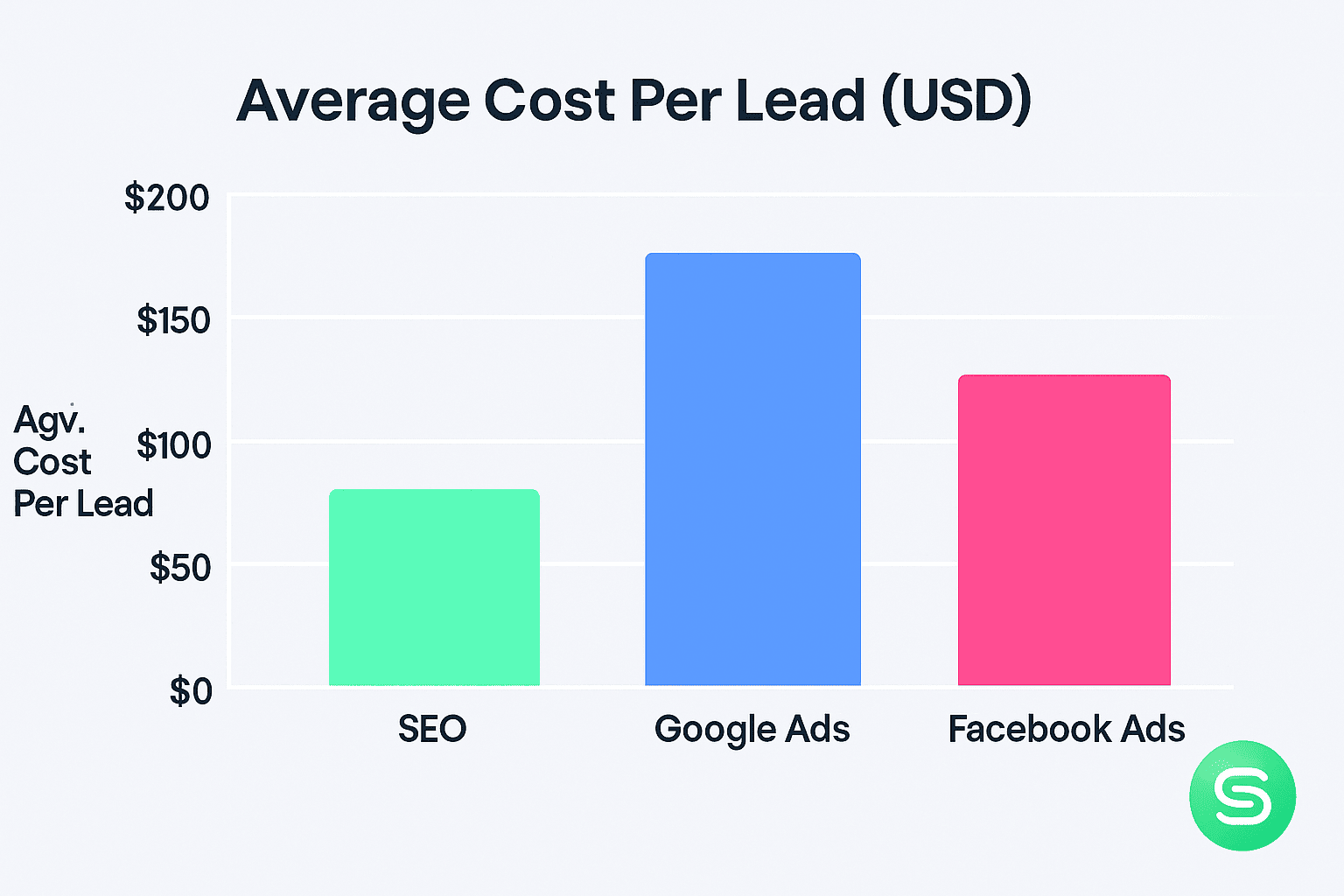
| Channel | Monthly Cost | Avg. Cost Per Lead | Pros | Cons |
| Local SEO | $500–$2,500 | $20–$80 | Keeps working over time | Takes a few months |
| Google Ads | $1,000–$4,000+ | $50–$180 | Fast results | Stops when paused |
| Facebook Ads | $500–$2,500 | $80–$200 | Retargeting + brand awareness | Lower buyer intent |
SEO is the only channel that keeps driving leads even when you’re not actively spending. Once you’re ranking, your site and map listings work for you 24/7 – no pause button, no daily budget limits. Unlike ads, which stop the second you turn them off, SEO compounds over time. It builds authority, trust, and visibility – which means more service calls without paying for every click.
Get more plumbing customers with SEO G.O.A.T.
We specialize in local SEO and have helped dozens of plumbing businesses rank higher, get more calls, and grow consistently – even in competitive cities. From Google Maps to keyword content and high-quality guest posting, we handle every piece that actually moves the needle.
Book a free consultation and let’s build a local SEO strategy that brings real results to your business.
FAQ
How to find customers as a plumber?
Start with local SEO – most people search online when they need help. Optimize your Google Business Profile, create city-specific service pages, and get listed on local directories. Reviews and referrals matter too, but being visible in search is where consistent leads come from.
What are negative keywords for plumbers?
Negative keywords are terms you exclude in paid ads to avoid wasting budget. For plumbers, that might include “DIY plumbing,” “free plumbing courses,” or “plumbing job openings.” These searches aren’t from customers – they’re from people looking to do it themselves or find work.
What is local SEO for plumbers?
Local SEO is the process of making your plumbing business show up in Google when someone nearby searches for help – like “clogged toilet repair near me.” It includes your Google Business Profile, service pages for each location, and directory listings with consistent info.
Why is local SEO important for plumbers?
Because plumbing is urgent – people need help fast. When your business shows up first in Google’s map pack, you get the call. Without local SEO, you’re invisible to the customers actively looking to hire someone right now.
How do I market myself as a plumber?
Focus on search visibility first: local SEO, reviews, and content. Then layer in social proof like project photos or short videos. Email campaigns and retargeting ads work later – but start with the thing that gets you found when it matters most. and have helped dozens of plumbing businesses rank higher, get more calls, and grow consistently – even in competitive cities. From Google Maps to keyword content and high-quality guest posting, we handle every piece that actually moves the needle.

